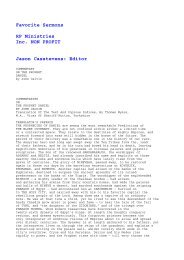Lamentations - The Sermon Depository
Lamentations - The Sermon Depository
Lamentations - The Sermon Depository
You also want an ePaper? Increase the reach of your titles
YUMPU automatically turns print PDFs into web optimized ePapers that Google loves.
word, hdyn, nide, ought properly to be applied to their exile, when the<br />
Jews became unfixed and vagrant. F11 It is added, that she was despised and<br />
treated reproachfully by all who before esteemed and honored her. This<br />
also did not a little increase the grievousness of her calamity; she had been<br />
repudiated by her friends, by whom she had before been valued and<br />
honored. <strong>The</strong> reason is mentioned, because they saw her nakedness. But<br />
the word properly means turpitude or ignominy. It is at length added, that<br />
she even groaned and turned backward; that is, that she was so oppressed<br />
with grief, that there was no hope of a remedy; for to turn backward means<br />
the same as to be deprived of all hope of restoration. F12 It now follows, —<br />
<strong>Lamentations</strong> 1:9<br />
9. Her filthiness is in her skirts; she<br />
remembereth not her last end;<br />
therefore she came down<br />
wonderfully; she had no comfort. O<br />
Lord, behold my affliction; for the<br />
enemy hath magnified himself.<br />
9. Ignominia ejus in fimbriis ejus,<br />
non est recordata finis sui; et<br />
descendit mirabiliter, nemo<br />
consolator ei; vide, Jehova, afflic<br />
tionem meam, quia magnifice se<br />
effert hostis (ad verbum,<br />
magnificatus est hostis.)<br />
He continues here, as I think, the same subject; he had said at the end of<br />
the last verse that turpitude or baseness had been seen at Jerusalem; and<br />
now he says that it was on the very fringes or skirts. <strong>The</strong> Prophet seems<br />
to allude to menstruous women who hide their uncleanness as much as<br />
they can; but. such a thing is of no avail, as nature must have its course. In<br />
short, the Prophet intimates that the Jews had become filthy in no<br />
common degree, being so afflicted that their uncleanness appeared on their<br />
skirts. This seems to be the Prophet’s meaning. Interpreters think that<br />
Jeremiah speaks of the sins of the people, but they are mistaken; for I<br />
doubt not but that the reference is to their punishment. <strong>The</strong>y say that<br />
filthiness was on the skirts, because the people had shamelessly<br />
prostituted themselves to all kinds of wickedness, and that they<br />
remembered not their end, because they had become altogether foolish,<br />
according to what is said in the song of Moses,<br />
“O that they were wise, and would foresee their end?<br />
(Deuteronomy 32 29.)<br />
But let any one duly consider the design of the Prophet, and he will readily<br />
agree with me that he speaks not of guilt, but on the contrary of<br />
punishment. F13<br />
<strong>The</strong> Prophet then says that the reproach of the Jews was on their skirts,<br />
because they could not hide their disgrace, For shame often makes men to<br />
hide their evils and silently to bear them, because they are unwilling to<br />
expose themselves to the mockery of their enemies. But the Prophet says<br />
that the miseries of the people could not be kept hidden, but that they<br />
appeared to all, as the case is with women subject to an overflow — it<br />
issues forth to the extremities of their garments.<br />
And when he says that she remembered not her end, I understand this to<br />
mean, that the Jews were so overwhelmed with despair, that they did not<br />
raise up their thoughts to God’s promises; for it is no ordinary source of<br />
comfort, and what even common sense dictates to us, to take breath in<br />
extreme evils, and to extend our thoughts farther, for misery will not<br />
always oppress us — some change for the better will happen. As then<br />
men are wont thus to sustain themselves in adversities, he says that the<br />
Jews remembered not their end; that is, they were so demented by their<br />
sorrow, that they became stupified, and entertained no hope as to the<br />
future. In short, by these words, he denotes extreme despair; for the Jews<br />
were so stupified that they could not raise up their minds to any hope.<br />
And the reason is expressed, because they had come down wonderfully,<br />
that is, because they had been cast down in an extraordinary manner. A



